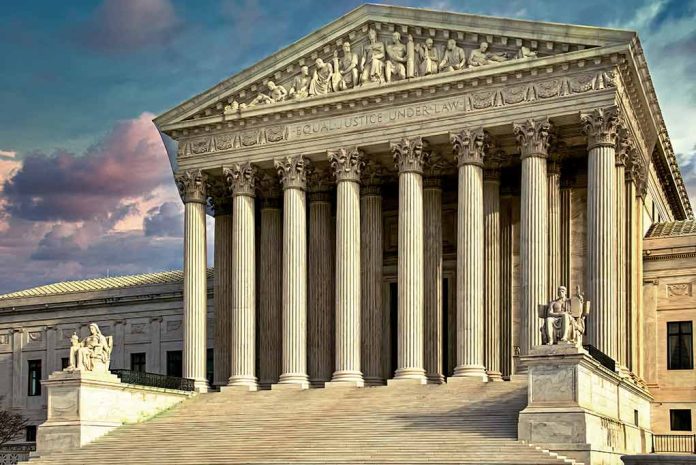
Michael Cohen, former attorney to Donald Trump, escalates his legal battle to the Supreme Court, alleging retaliation for his tell-all book.
At a Glance
- Cohen appeals to Supreme Court, claiming Trump blocked his prison release as retaliation for a critical memoir
- The case raises questions about executive power, free speech, and constitutional rights
- Lower courts have rejected Cohen’s lawsuit against Trump, former AG Barr, and other officials
- A federal judge previously ruled Cohen’s re-incarceration was “retaliatory”
- The outcome could have significant implications for executive accountability and individual rights
Cohen’s Supreme Court Appeal
Michael Cohen, once Donald Trump’s personal attorney, has taken his fight against alleged retaliation to the nation’s highest court. Cohen claims that the former president and top officials conspired to revoke his pandemic-related home confinement as punishment for writing a critical tell-all book. This case highlights crucial questions about the limits of executive power and the protection of constitutional rights in the face of potential government overreach.
The appeal follows rejections from lower courts to revive Cohen’s lawsuit against Trump, former Attorney General Bill Barr, and other Justice Department officials. Cohen’s legal team argues that this case is pivotal for defending First Amendment rights against executive misconduct.
Michael Cohen asked the Supreme Court on Wednesday to revive his lawsuit accusing former Pres. Trump and some Trump administration officials of retaliating against him when he sought release from federal prison. https://t.co/zKlUcD4K7K
— ABC News (@ABC) July 10, 2024
The Heart of the Matter
The crux of Cohen’s lawsuit stems from his re-incarceration and placement in solitary confinement after announcing plans to publish a book about Trump. A federal judge had previously ruled that Cohen’s re-incarceration was “retaliatory” and ordered his release. This ruling underscores the potential constitutional violations at play in this case.
“It is hard to imagine a more clear-cut violation of the Constitution than jailing an American for expressing his political opinions.” – Slate
The case raises important questions about the scope of Bivens claims, which allow individuals to sue federal officials for constitutional violations. Recent Supreme Court decisions have narrowed the applicability of such claims, making Cohen’s appeal a potential landmark case for determining the extent of executive accountability.
Michael Cohen is asking the Supreme Court to revive a lawsuit against Donald Trump alleging he and others conspired to use the federal prison system to silence Cohen’s criticism of his former boss. https://t.co/MMMVb3xcZ3
— Bloomberg Law (@BLaw) July 17, 2024
Implications for Executive Power
Cohen’s legal team emphasizes the need for the Supreme Court to act in preventing future government retaliation and ensuring executive accountability. They argue that rejecting the appeal could undermine protections against executive retaliation and threaten American freedoms.
“This is a case of first impression,” Cohen said of his filing. “No president should ever be permitted to weaponize the Department of Justice through a willing and complicit attorney general to have a citizen unconstitutionally remanded to prison (solitary confinement) because they refused to waive their First Amendment right. It’s a case ripe for the SCOTUS.”
The outcome of this case could have significant implications for free speech and the balance between constitutional rights and executive power. It highlights ongoing debates about presidential power limits and the protection of individual rights in the face of potential abuse of authority.
Sources:
- Donald Trump Jailed a Critic During His First Term. Does the Supreme Court Care?
- Michael Cohen asks the Supreme Court to revive his lawsuit against Trump
- Michael Cohen lodges final brief as Supreme Court weighs whether to take Trump appeal
- Michael Cohen asks the Supreme Court to revive his lawsuit against Trump
- Michael Cohen lodges final brief as Supreme Court weighs whether to take Trump appeal
- Michael Cohen asks Supreme Court to revive Trump retaliation suit









